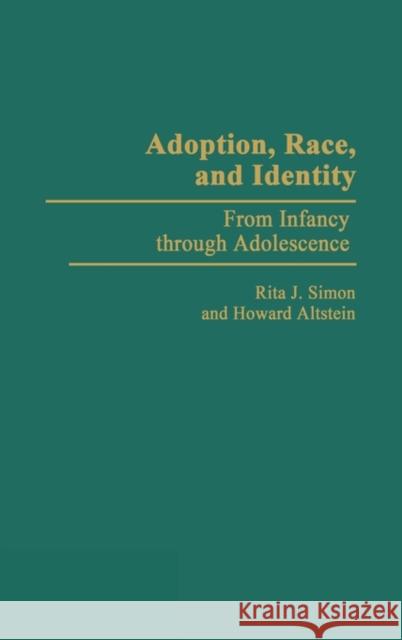Adoption, Race, and Identity: From Infancy Through Adolescence » książka
Adoption, Race, and Identity: From Infancy Through Adolescence
ISBN-13: 9780275937485 / Angielski / Twarda / 1992 / 232 str.
Adoption, Race, and Identity examines the innovative placement of nonwhite (predominantly black) adoptees with white parents. In addition to reviewing recent court decisions involving race as a factor in child custody, authors Rita Simon and Howard Altstein examine the research to date on this topic, including adoption policy and practice as carried out by some adoption agencies. Although there are a few anecdotal portraits of typical situations, the work is almost exclusively devoted to actual responses to questions about the experiences of these families based on a longitudinal study that began in 1971. The authors conclude that the majority of families and their adopted children are well integrated into society and that the adoptees now, as adolescents, do not see themselves as any less black than their in-racially raised peers.
Chapters 1 and 2 examine the historical and legal background of transracial adoption. The authors discuss numbers and trends, founding social movements, agency practices, and the legal status of transracial adoption over the past forty years. They present the arguments by the National Association of Black Social Workers against the practice, and responses offered by various adoption networks. Chapter 3 details the authors' research method for the study of families and their transracial adoptees, and integrates a review of the research literature. The following chapter provides demographic and social psychological data on the 200 families involved in the study, and examines their stated reasons for adopting. Chapters 5 and 6 evaluate the responses to the study by parents and by adoptees and their siblings. Chapter 7 reviews the families' experiences from both the parents' and children's perspectives, and Chapters 8 and 9 discuss problem families and ordinary families, respectively. The work closes with an examination of alternative forms of child placement, a discussion of social policy, and suggestions for future research and practice. This study will prove valuable to social workers, adoption agencies, and scholars and practitioners in related fields.











